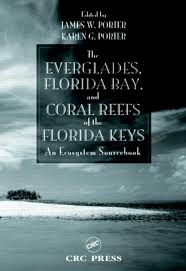Coral reefs have evolved over millions of years where “symbioses” facilitated efficient cycling of nutrients within reef organisms in “oligotrophic” or low-nutrient conditions. Nutrient pollution has resulted in algal over-growth, coral diseases, loss of biodiversity and ecosystem services. Over 75% of the world’s coral reef are threatened or have been lost. The future of the world’s coral reefs is challenged by their resilience to human-induced climate change, as global temperatures, sea-level and ocean acidity rise.

Biotic phase-shifts in Florida Bay and Fore Reef communities of the Florida Keys
Chapter from Porters’ The Everglades, Florida Bay, and Coral Reefs of the Florida Keys: An Ecosystem Sourcebook
Brian E. Lapointe, William Martzie, Peter Barile
Further Research
- Jacoby et al. 2004. Are native and nonindiginous seaweeds overgrowing Florida’s east coast reefs?.pdf
- Lapointe et al. 2005. Macroalgal blooms on southeast Florida coral reefs II. Cross-shelf-discrimination of nitrogen sources indicates widespread assimilation of sewage nitrogen.
- Lapointe et al. 2019. Nitrogen enrichment, altered stoichiometry, and coral reef decline at Looe Key, Florida Keys, USA: A 3-decade study.
- Lipp et al. 2002. Preliminary evidence for human fecal contamination in corals of the Florida Keys, USA.
- Mailiao et al. 2008. Phase-shift in coral reef communities in the Florida Keys National Marine Sanctuary, USA.
- Miami-Dade County Department of Regulatory & Economic Resources et al. 2018. Septic Systems Vulnerable to Sea Level Rise.pdf
- Pandolfi et al. 2015. Are U.S. coral reefs on the slippery slope to slime?
- Patterson et al. 2001. The etiology of white pox, a lethal disease of the Caribbean elkhorn coral, Acropora palmata.
- Shumway. 2019. Coral reef conservation must embrace the role of nutrient enrichment and altered N:P stoichiometry: editorial comment on the article by B.E. Lapointe et al.
- Sommerfield et al. 2007. Changes in coral reef communities among the Florida Keys, 1996-2003.
- Ward-Paige et al. 2005. Clionid sponge surveys on the Florida Reef Tract suggest land-based nutrient inputs.
